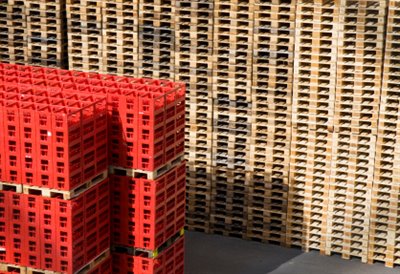
You are the warehouse or transport manager of a new manufacturing company based in Southern Quebec or New England, or your company has just relocated to the region. Either way, you need to find a pallet manufacturer and supplier, and you’re evaluating your options. Should you go with wooden pallets or plastic?
Here, to help you make the right decision, are the answers to the most frequent pallet-related questions.
Q: Which are the cheapest to purchase, wood or plastic pallets?
A: Pound for pound, wood pallets can be 3-6 times cheaper than plastic.
Q: Which material is the strongest?
A: While the construction of both plastic and wood pallets can be customized, depending on the load capacity required, it should be noted that plastic pallets are prone to plastic creep (collapse without warning even under loads of less than capacity).
Q: Are plastic pallets more durable?
A: Properly constructed wood and plastic pallets are both extremely durable. However, once the structural integrity of a plastic pallet has been compromised, the pallet is useless. Wood pallets, however, can be repaired and returned to circulation many times.
Q: Are wood pallets sanitary?
A: For the transport of food or pharmaceutical products, and to stop the spread of insects and larvae, all packaging materials must be extremely sanitary...especially if goods are to cross borders nationally or Internationally. Chemically treated wood pallets and crates can leave a residue that may leech into freight. And the chemical process that takes place during the manufacture of plastics pallets also leaves a chemical and gaseous residue that can contaminate freight. Heat treated pallets (pallets are placed in an oven and heated to a minimum temperature of 56°C (133°F) For at least 30 minutes) contain no liquid or gaseous residue and are guaranteed to be insect and larvae free, making these wooden pallets the most sanitary in the industry today.
Q: Which pallet material is the most environmentally friendly?
A: Wood pallets are constructed from lumber taken from sustainable forests (there are more trees in North America today than there were just 70 years ago). But plastic pallets are constructed using a chemical process that depletes fossil fuels and, during manufacture, produces noxious gases. Furthermore, unlike plastic pallets, wood pallets can be repaired many times and, when they finally reach the end of their lifespan be recycled into biomass
HWP is everything your company needs in a pallet manufacturer. If you re looking for a New England pallet manufacturer or a southern Quebec pallet manufacturer, then look no further than Windsor, Quebec, based HWP. With over 65 years of experience in the manufacture of millions of wood pallets, third generation family owned HWP is perfectly equipped and positioned to be your wooden pallet and wood crate supplier. HWP heat treat all of its wood packaging and the company is fully compliant with the latest HT-ISPM 15 regulations, meaning your goods can cross all borders without the risk of costly delays. HWP operate a 100% green cycle, meaning that from the manufacture of pallets through to the repair or recycle, nothing is wasted. With a wide range of standard -sized pallets always in stock, and the ability to custom design and build wood pallets and wood crates to exact specifications, HWP is able to service clients in a wide range of industries. For more information or to request a quote, contact HWP today.